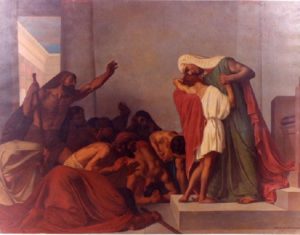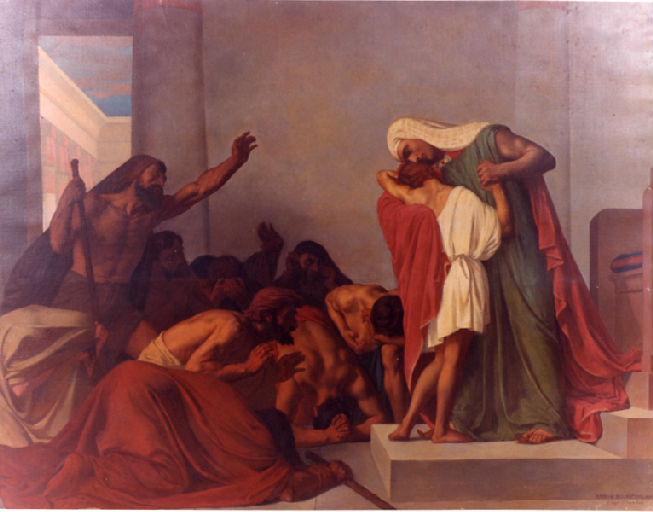
Joseph’s forgiveness of his brothers followed much solitude and prayer.
Blessed are the merciful, for they will receive mercy…. Blessed are the peacemakers, for they will be called children of God (Matthew 5:7, 9).
As colorful as his famous coat, Joseph’s story keeps us on the edge of our seats like none other in scripture.
The long story short: After Joseph’s Aunt Leah bears a long line of older half brothers, Rachel, the love of Jacob’s life, finally gives birth to Joseph. Defying all parenting guidance, Jacob gives him a special coat of many colors like no older brother ever saw. Then Joseph makes matters worse by telling his dream that they would someday bow down to him. In a jealous rage, they beat him and sell him as a slave to Egyptian passersby.
In Egypt, his owner, Potiphar, takes a shine to the lad, but unfortunately, Potiphar’s wife does too in a salacious way. When Jacob escapes her lusty clutches, she accuses him of hitting on her, which lands him in a dungeon. But guards there discover his gift for dream interpretation, and this enables him to provide Pharaoh with a more accurate economic forecast than any in the Wall Street Journal. Jacob catapults from doomed dungeon dweller to chief of staff.
Economic forecasts often parallel weather forecasts: Pharaoh heeds Jacob’s prediction of a drought and fills the barns to bursting with grain to get them through it. Meanwhile, back in Israel, Jacob sends his sons to scout out prospects for resettling in Egypt for the groceries. This takes them straight to a meeting with Joseph whom they do not recognize. After toying with them a bit, Joseph cannot stand it any longer and reveals his identity. As they reel – and after they bow down to him – Joseph declares his forgiveness:
Do not be afraid! Am I in the place of God? Even though you intended to do harm to me, God intended it for good, in order to preserve a numerous people, as he is doing today. So have no fear; I myself will provide for you and your little ones (Genesis 50:19-21).
And so he did.
How did Joseph’s forgiveness develop? The words of the story do not say. But I suspect that the long lonely spells between verses hold the clue. As much as Joseph’s story tells of a colorful coat and dreams and tragedy and a rise from the ashes, it is about a boy bound on a hot, bumpy ride to slavery in a foreign land, long years of servitude, and a life sentence in a dungeon. The spaces between verses measure about a character’s width on the page, but in reality, they stretched before Joseph beyond any horizon of hope.
Developing a heart large enough for Joseph’s forgiveness often depends on what one does with the long loneliness, those long, arid seasons with no end in sight, no certain outcome. Or rather, they depend on our consent to what God does with us during those Sahara-wide tracts of time. Do we give up on God and resign ourselves to whatever alienation, slavery, or imprisonment tries to claim us? Or do we wait for God, trusting that God loves us, suffers with us, and moves to liberate us?
And if we wait for God, do we wait for our narrow version of God who hates the ones who put us in this place? Or do we wait for the God whose mercy exceeds our imagination, who aims to reconcile all of us in God’s time?
Generations later, the long-awaited Messiah taught something about the discipline of the heart in the long seasons between offense and forgiveness, between alienation and reconciliation:
But I say to you that listen, Love your enemies, do good to those who hate you, bless those who curse you, pray for those who abuse you. If anyone strikes you on the cheek, offer the other also; and from anyone who takes away your coat do not withhold even your shirt. Give to everyone who begs from you; and if anyone takes away your goods, do not ask for them again. Do to others as you would have them do to you…. Love your enemies, do good, and lend, expecting nothing in return. Your reward will be great, and you will be children of the Most High; for he is kind to the ungrateful and the wicked. Be merciful, just as your Father is merciful (Luke 6:27-31, 35-36).
It takes a long time to develop such forbearance, forgiveness, and hope. You cannot do it alone. But even if bound in a slave wagon or chained in a dungeon, you are not alone. And if you open your heart to Christ and let him teach you, the long loneliness will not overcome you.
Related Posts:
Choosing Goodness With No Reward In Sight
Dr. King’s Medicine: Love Your Enemies


0 Comments